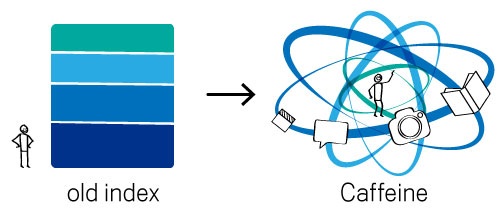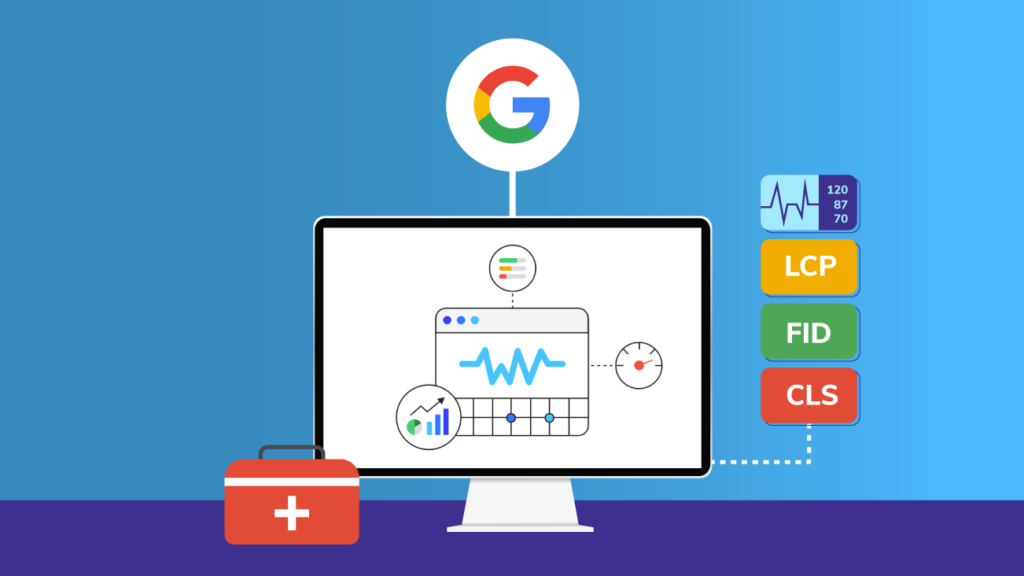Updated February 2025
Google normally manages to hurl significant curve balls to Webmasters, SEO companies, Digital agencies and business owners alike in its constant mission to improve the quality of its results (which ultimately, is never a bad thing). Part of this process is continually tweaking its signals to remove or degrade low quality sites and reward sites which it perceives to be of good quality. What are these positive ranking signals? Let’s take a deep dive into which ranking factors are relevant in Google search in 2025.
Table of Contents
The Study
My team and I assembled data from over 340 websites (344 if you want to be exact) that we have been tracking since the beginning of 2024. We gave the the choice of sites a fair spread – some large corporate sites all the way through to small/medium sized businesses.
The Results
Here’s the data visualised:

Alas, links still packed the biggest punch in terms of ranking influence. However, content plays a huge a role in all of this, let’s dissect. Below is a deep-dive into the top 7 factors that had the biggest influence.
Links (yes, they’re still the most important factor)
I’ve made countless statements about links and how I think their relative impact will continually be diluted by other factors – particularly F.A.C.C (freshness and consistency of content) – and in my study links certainly didn’t eclipse F.A.C.C – and I’m still of the strong belief this will happen in the not so distant future. In fact, I have seen many studies that argue that links have already lost their value and are already secondary to content – but this wasn’t the case in my study.
I could leave it there that yes, backlinks are the most important factor, however, I did make some interesting observations when it comes to links and I’ll address these now.
Although links were the most important factor overall, consistency and freshness of links was far, far more important
This was a very important finding within the study. I found a direct correlation between sites that have a great link profile but were fundamentally low on new acquisitions VS sites that had in comparison a smaller link profile, but were attracting links consistently. There’s always the discussion of fresh content and its relative importance, but link freshness appears to be extraordinarily important.
To illustrate this point, when averaged out across all the sites, the new monthly referring domain counts and correlation of rankings was pretty clear:

With this being said though, shady link tactics were definitely an exception to the above rule
Out of all the sites I had within my study it was clear that only sites that were earning links legitimately (or indeed looked to be earning them legitimately) were being rewarded – and for the most part, rewarded very well. Sites that utilised blatant shady link tactics saw some quite drastic tumbles (another penguin update on the horizon?)
Anchor text within backlinks seem to be put under more scrutiny
There’s a balance between utilising natural anchors (like brand names, naked URLs etc) and using money keywords in the anchors. It’s clear that sites that had been using overtly keyword specific anchor text that there was a relative decline in rankings in many of the sites for that particularly term. Interesting to note though that semantic variations of the keywords being over-used in anchors were unaffected for the most part.
It’s very important that if you’re reaching out for links that you take a real good look at your anchor text ratios to make sure that you’re not over-optimising which could see your site in hot water in the SERPs.
In short, links had the biggest impact, but consistency and freshness of the links played the most significant role in the overall ranking impact on Google.
F.A.C.C (Freshness & Consistency of Content)
The phrase “content is king” I agree with wholeheartedly. Even though links in and of themselves are the most impactful ranking factor, links simply wouldn’t exist without content. Content is the fuel that fires up the link acquisition engine – without good content – it’s very hard to attract good links.
Here’s a couple of buzzwords for you; ‘freshness’ and ‘consistency’ – also mentioned within the links section of this article. In June 2010, Google rolled out an update called ‘Caffeine‘ which was a game-changer for the search landscape.
What was the Google Caffeine Update?
Caffeine was fundamentally a new indexing system. The primary focus of this algorithm update was to essentially crawl and store data more efficiently. The update in Google’s words not only increased their capacity of indexed pages, but also made their results ‘50% fresher’.

This new model of freshness and efficient indexing paved the way for the ‘freshness’ algorithm update in November 2011. Again, this was a big change which impacted 35% of all search results. As the name suggests, this update laser focused on how relevant and indeed ‘fresh’ a websites’ content was in relation to recent topics, events and news.
Google has a constant need and hunger to serve up its searchers with the most relevant, up to date information about its users search queries – and this makes perfect sense.
So what do you need to do?
Whichever industry you’re operating in you need to ensure that you’re providing Google with consistent, fresh content for it to feed on. By continually feeding new, great content to your website visitors, you will be rewarded. Content is something that should never stop evolving on your site, you should always be striving for ways you can build out your content to become a hub of information surrounding your products and services.
If you do this well, you will be rewarded over time. And hey, great content attracts great links, so you’re killing two birds with one stone here.
Keyword usage in your title tags
Keyword usage in your title tag is still an incredibly important metric according to my study. From all the websites tested, those that weren’t utilising a title tag properly rarely ranked in optimal positions for the query.
What is a title tag?
The title tag is the title that you define for a specific page. It’s also what you see whenever you run a search query through Google. For example, for the query ‘Nike Trainers’ you will see this:

You will notice that all first page results were using the term ‘Nike Trainers’ in their title tag. A title tag fundamentally tells Google what the page is going to be about.
There is a caveat though, try not to overuse your keywords in your title tag as it can work against you rather than for you. It’s also not recommended that you go above 50-60 characters (Google truncates overtly long title tags). Keep it short, snappy and appealing – and include your keyword that you’re targeting for that specific page and you’ll be golden.
E-A-T / Niche Expertise
In August 2018 Google released something known as the Medic update – again, this update was groundbreaking but it also put something called E-A-T under the microscope and intrigued every single SEO on the planet that wasn’t aware of what E-A-T actually was.
What is E-A-T?
E-A-T stands for Expertise, Authority and Trustworthiness and is part of Google’s search quality raters guidelines. Long gone are the days where you can simply put content out into the ecosystem and immediately rank for the queries related to it. E-A-T is a way of encouraging sites so build their brand through correct, useful and insightful content – almost nurturing the brand to content excellence.
In the era of ‘fake news’ this is a truly effective method to weed out content that may be misleading. E-A-T has a particularly large impact on YMYL (yep, more abbreviations I’m afraid) which stands for Your Money or Your Life pages. Google describes these pages as “ones that could potentially impact a person’s happiness, health, financial stability, or safety” – which is why the medic update had a profound impact on the medical industry in particular.

Fun fact, Barry Schwartz over at SEORoundtable coined the phrase ‘Medic Update’ due to how many medical related sites it actually impacted.
How do I make sure that I’m covering the E-A-T ranking signal?
Whatever niche you’re operating in you must become an expert in that field and (regularly) put out content that is factually correct, useful and insightful.
As mentioned before though, E-A-T takes time. If you’re operating in an industry that you don’t truly understand then it’s certainly high-time you start learning (this is particularly true of affiliate sites in order for them to be organically successful).
Becoming an expert in your niche is useful for everyone, not only Google. By providing accurate and useful information to your visitors you will stand more of chance in conjuring up a following, increasing conversions and most importantly, increasing the bottom line. All the while Google will reward your efforts – it really is a win-win situation.
Internal Link Architecture
It’s funny, I was having a conversation the other day with a good friend of mine which runs an affiliate electronics store in the US and he often asks me varying SEO questions whilst self-teaching himself the ropes. One of the topics that had come up recently over a cold (socially distanced) beer was internal links and how to properly architect an internal link infrastructure on a website. I later on found out that he had gone through well over 100 pages of content and had linked his homepage from all 100 pages with his money keyword – he was then stunned when I told him that this could have a potentially adverse effect instead of a positive one.
Internal linking is often overlooked, but most importantly, it’s something that is often done incorrectly and in fact, I’m willing to bet a few quid that you reading this right now (yes, you) have probably made a few faux-pas when it comes to implementing internal links on your own site. I’m going to do a much more in-depth article on internal links, I will link to it from here when that’s up.
Firstly, what exactly is internal linking?
Internal links are links that are found on a website linking to other pages on the same site rather than linking out externally.
Google uses links to navigate through a website and will also use them as a signal to ascertain how important certain pages are within a website. The idea is that the more internal links a page has pointed at it, the more important that particular page is.

The purposes of internal linking
There are three main areas where internal links help with your rankings, these are:
- Aiding in website navigation
- Distributes pagerank (ranking power) throughout the site
- Defines the hierarchy and architecture of a website
How to do internal linking correctly
I will be doing a much more in-depth post on internal linking, but for now, here’s some quick tips on ensuring you’re getting the most of your strategy.
- Create lots (and lots) of great content. In order to have a great internal linking strategy you need to have the pages to actually link to. Ensure you’re creating good content regularly
- Use anchor text – try not to internally link from images, text is far more useful for both users and search engines. Do not over optimise your internal linking by using money keywords in every single link. Your links and linking patterns should be natural and flow easily within the content. Linking your money keyword in every post you do to the same page is not going to help (sorry Chris – my friend with the store who did exactly that – real name redacted to save embarrassment)
- Don’t link to your homepage or other pages found in your main navigation, link deep. Use your homepage for brand related searches and try not to link to other pages found within your main navigation. These pages are already linked to countless times throughout your site through the navigation and (probably) don’t need more links. Linking to other blog posts and other pages found deeper within your site will help those to become more prevalent and provide Google with a natural linking pattern.
- Make sure your internal links are relevant. Too many times have I seen internal links which simply do not make sense. For example, if you have a page that’s talking about which Nike Trainers to buy and you’re linking to another page which is to do with Adidas hoodies, is this a relevant internal link? Pages you link to should be relevant to the page and topic in question for the best type of internal link to be achieved.
- Create links that actually help the user. Take your mind off of SEO for second. Does the internal link you’re about to create genuinely help the user? I.E from interacting and clicking that link will they glean relevant information from the linked page? If the answer is no, you probably shouldn’t insert that link.
- Steer Clear of extensive footer links. I’ve seen countless sites in my study implement site-wide links in their footer (particularly sites that have multiple geographic areas they’re targeting). The problem with having huge blocks of footer links is that they’re repeated across the site and can quickly multiply to thousands of internal links and Google are often quick to penalise this type of aggression.
- Don’t overdo it – be sensible with the amount of internal links. This is actually easier said than done as there is no ‘real-world’ number of what constitutes as a ‘sensible number’ of internal links. As a guideline, I’d say (using my experience) 3-4 internal links is more than adequate in a piece around 1000-2000 words.
Mobile Responsiveness
Google is heavy on its ‘mobile-first indexing‘ narrative and for good reason too; mobiles drove 68.1% of global traffic to websites in 2020 whilst desktop traffic sat at just 28.9% according to Perficient. It’s worth noting that this figure on mobile usage was up 63.3% on 2019 which shows that mobile is here to stay.
It’s for this reason that Google encourages web designers and site owners to ensure that their sites are designed with mobile users in mind – and it’s a ranking signal.

How to make sure your site is mobile responsive?
Google has a handy tool you can use here to check if your website is responsive on mobile – run your URL through that.
What if my website isn’t mobile friendly?
There’s numerous way you can make your site mobile friendly and at this point, if you’re not a developer, it would be a good idea to discuss either converting your current site to a responsive site – or indeed look for a rebuild. SEOPressor did a great little article on this for guidance.
In short, it’s pretty much essential that your website is mobile friendly and it will be a detriment if it isn’t – not just for search engines, but for users too. Make the switch as soon as possible to give your visitors and Google the best experience.
Page Speed/Site Performance
Anyone that knows me will tell you that I’m an absolute stickler for site speed – I simply cannot stand slow websites (which is why you’re reading this on a lightning fast HTML5 site – big props to Publii). As the tech world has evolved so has our expectation of websites performance. We’re in a world where everything is immediate and things that aren’t immediately available to us tends to aggravate us – and websites are no exception here.
A slow site can seriously damage your bottom line
In order to make money websites tend to need to retain visitors. In a graphic shared by Google it showed that if your websites load speed went up to 5 seconds you could expect 90% of your traffic to bounce. 5 seconds – it doesn’t seem much, but in the ‘now’ world of today, 5 seconds is a lifetime. Here’s the graphic:

As you can see, the demands of today dictate that a sub 1 second load time is optimal. Not sure how fast your site is? Check your site speed over at GTMetrix
Site Speed is a ranking factor
In July 2018 Google announced that speed was now a landing page ranking factor on mobile devices which is why, in order to get the most of your SEO efforts, you need to make sure your site loads fast. Keep in mind the above too – it’s not just Google you’re helping here, you’re helping your visitors a lot too.
How to speed up your website
At this point it’s worth speaking to your developer or someone with experience in speed optimisation. My team actually offer this service if you need outside assistance.
Page Experience Update

Google announced back in 2020 that in 2022 (yep, they gave a lot of notice for this update which is particularly rare) they would be releasing an update that focuses on page experience. Many webmasters would now notice that within search console there is a new area called ‘core web vitals‘ and this looks at varying different technical aspects that Google determines affects a users experience of a web page.
What are core web vitals?
In a nutshell – Core web vitals are a range of different factors of a landing page that Google considers important for user experience – and you’d be doing yourself a favour by checking your own sites scores to see how you tally up. You can do this through Google Search Console (will need to be installed if you haven’t already got search console) or you can a check with Google’s pagespeed insights
How to fix core web vitals
If your site is currently in the red when it comes to your core web vitals then do not panic. If you’re technical yourself you can find everything you need to know about fixing your vitals here.
If however you’re not technical then it would be wise to seek the help of a developer. We actually offer site performance optimisation – feel free to get in touch if you need outside assistance.
To sum up, ensuring that your site is fast and that your page experience is great for users should be an integral part of your overall SEO strategy. Having a fast site and ensuring visitors don’t bounce has an effect on multiple different factors on this list – so get tuning up your site.
Worthy mention: Schema Markup
I did say I’d cover the top 7 ranking factors in-depth but I feel like schema needed a mention given it’s continued prevalence in the search results.

What exactly is schema markup?
Schema markup (also known as structured data or microdata) is a data set collection/vocabulary that helps Google better understand what a specific web page is about and to serve ‘rich results’. A rich result is an ‘enhanced’ listing in a Google search (see above) with extra visual or interactive features. If you’ve used Google before, chances are you’ve seen tonnes of them.
Why is schema markup important for SEO?
There is no evidence that schema actually improves organic rankings, so why am I giving schema a special mention? It’s simple really, Schema can help your pages appear more prominently in Google search and has been known to drastically improve CTR (there I go again – CTR = Click Through Rates) which is what we as webmasters all want, isn’t it?
When I conduct any SEO strategy schema is always at the front of my mind as to how I can properly mark up a page to make it easier for Google to discover the content and know exactly what the page is about – and most importantly, what data sets I can make available to them.
Just look at the rich result here when I typed in ‘Next Gigs at Wembley’:

I mean, who wouldn’t click that?
How do I implement schema markup properly?
Schema markup can be added to the source code of your website and there’s a lot of options available to you when it comes to implementing the code. If you’re a WordPress user then you have an abundance of plugins that do (most) of the hard work for you (I like this one)
If however you’re not technical and you need assistance then it would be good to hire a professional to assist you.
In summary, although Schema doesn’t have a direct influence on rankings, it can work miracles for your CTR and help your content become more visible in general.



